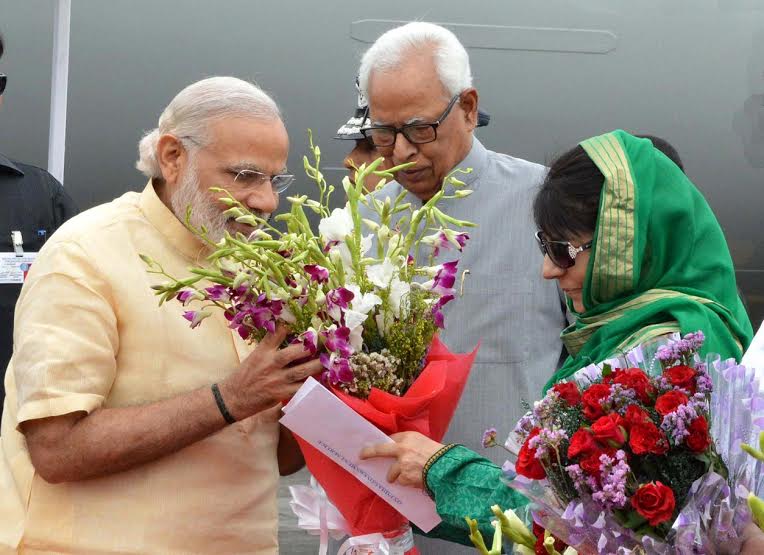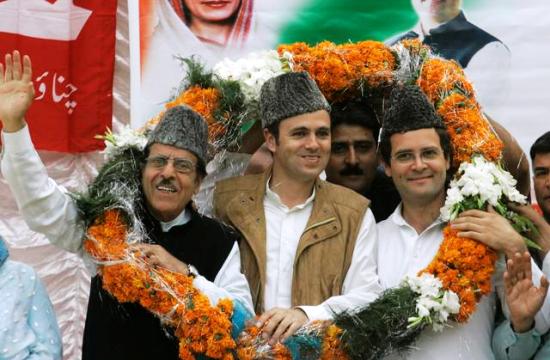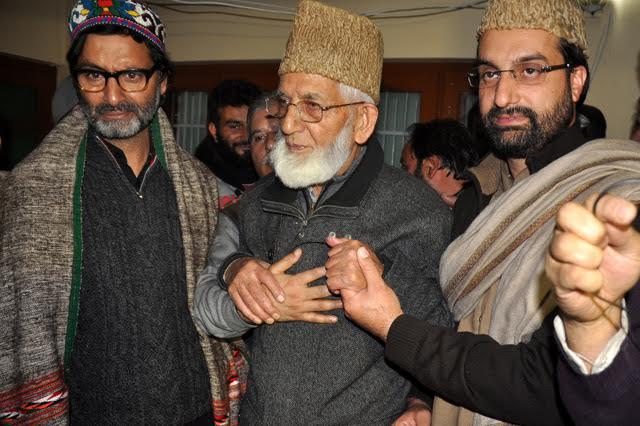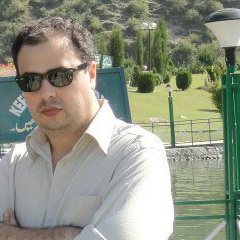by Jahangir Raina
Electoral democracy has not exactly been a complete failure in Kashmir. For a common person like me, it has occasionally succeeded in creating some breathing space in an otherwise politically-charged battleground of proxy-war between two neighbours.
One neighbour supports the rebellion. The other relishes in collateral damage while putting down that rebellion. In the midst of this proxy-war, our mainstream political structure seeks to borrow some political space on the back of some borrowed peace. From that particular standpoint, mainstream politics carries some significance in Kashmir’s political scenario.

A predominant feature of mainstream politics, however, is the complacency it assumes once elected with a mandate. It invariably becomes complicit with Delhi in jerking us around, providing only a lip service to dialogue and resolution.
PDP has gone one step further in that compromise. While it teamed up with BJP just to work out numbers in the assembly, it sold the alliance as some grand sacrifice for the unity of the state, knowing well that the arrangement would backfire. And indeed it backfired. Present revival in an insurgency is largely attributable to this politically provocative alliance.
If rigging of 1987 elections was a trigger for an armed rebellion back then, the ascendency of BJP in this sensitive state serves the exact same purpose today. Very few in Kashmir were willing to give Modi’s BJP a chance given his anti-Muslim politics. Their magnanimity evaporated fast as Modi subsequently continued with his provocative politics. The fact that an insensitive political structure rules a sensitive state like ours is something that our youth find hard to reconcile with.
The present insurgency may not follow the same tracks as the one triggered by 1987 rigging, but any keen observer can tell with confidence that the present insurgency matches the previous in terms of the pull factor within the valley. The number of rebel aspirants has already reached the tipping point. When it comes to armed rebels, the numbers are being contained by capping the availability of arms. Rifle snatching incidents in the valley corroborate the assumption that rebels are low on arms supply.
In absence of a political process geared towards resolution, the scenario only gets darker. No amount of politicking on the part of the mainstream will retrench that trend. If PDP decided tomorrow to snap ties with BJP, will the armed rebellion come to a halt? I don’t think it will. Much water has flowed under the bridge. From hereon, it is very difficult to salvage mainstream politics in Kashmir.
Omar Abdullah has spoken overseas before and with great fondness on his part. He has never faced the kind of hostility that he did at Berkeley and Princeton recently. Had the hostility anything to do with his 2010 debacle, it would have manifested earlier within those institutions of repute where he addressed scholars. Ironically, the hostility he faced has a lot to do with how Mehbooba Mufti, his political opponent, is handling things. It is a classic case in the democracy where one’s performance affects the opponent as well, and it speaks of disillusionment with the entire system. Clearly, the mainstream is being collectively rejected by Kashmiris.

It is also pertinent to mention that when Omar Abdullah started his innings as head of the state in 2009, people used to draw comparisons between him and Mufti Mohammad Syed, often giving the latter due credit for development and peace process during his reign. Today no such comparisons come up in the conversations. No one compares Mehbooba with Omar. The mainstream has been whitewashed as the monotonous same, inviting little curiosity and empathy.
It is obvious that the days ahead will be tough for the mainstream, which is rather sad because as a facilitator for borrowed peace, their shrinking space means further shrinking of possibilities in Kashmir. If the authorities held Anantnag parliament elections today, the polling is likely to be in single digit percentages of the voter population. In the next assembly election, it seems certain that voting percentages will go down substantially. Those voters will most probably be individuals who are personally mobilized by party workers having the patronage of the present dispensation. It will be an exercise in cronyism driven by personal benefits rather than considerations around policies or ideology. Nothing can be more damaging to a democracy.
In addition, it is likely that low turnout in the valley will favour PDP because it is their cadre that has benefited most recently out of that patronage. That leads us to a scenario of a second consecutive term for the present alliance. If BJP continues to remain part of the next government in the state, that extends the political provocation in this sensitive state for another six years. Not only will we witness further delay in dialogue and resolution, it will mean a prolonged period of militancy that could get deeply entrenched in our social fabric with increasing acceptance. Admittedly that is not desirable. Dialogue needs to start somehow.
Surely there must be avenues that would get Delhi to initiate the dialogue and come out of their perpetual state of procrastination, something that triggers a rethink. I would imagine if NC and PDP lawmakers serve Delhi with an ultimatum for initiating dialogue and proposition the centre with mass resignations from the assembly in absence of a sustainable dialogue, perhaps it would get us the requisite attention. At least it would salvage the remnants of the mainstream, which according to my thinking, and as outlined above, is an important component for ensuring peace in the valley. I don’t expect NC and PDP to rise to such an occasion, however. The privileges that elected politicians enjoy cast a spell in no time. It is a satanic temptation that compromises one’s agenda.

From hartals to armed revolt to peaceful rallies to regular spells of stone pelting, Kashmiris have tried everything to get attention. That has not compelled Delhi and Islamabad to establish a sustainable dialogue process. Sarcastic as it may sound, Kashmiris have since long run out of ideas. Separatists have been floating ‘Request-For-Ideas’ and they have been getting no new ideas. I wonder why. We opt for hartal because it is the easiest and most convenient to stay back home and take a day off.
I want to revisit an idea which was dead and buried with the election defeat of Muslim United Front (MUF) in 1987. A few years ago I was at a Wazwan party sharing trami with Professor Abdul Gani Bhat. As one of the founders of MUF and an anchor who orchestrated a substantial part of what transpired back then, I enquired from him about a rumour that was widespread in those times: MUF candidates had an internal understanding not to take oath if elected thus boycotting the legislative assembly. He confirmed that such understanding was in place. I asked him why MUF subsequently had not executed the idea. Apparently, once elected, the MUF lawmakers no longer thought that it was a good idea, as per Prof Bhat who was rather sarcastic about his ex-MUF colleagues for hurriedly proceeding to Jammu for oath taking ceremony.
Delhi projects our participation in elections as our approval for the status quo. That is its alibi for its procrastination. Whether the voting is 60 percent or 6 percent, it does not matter much to Delhi. It is evident that there will never be a complete boycott of elections in the valley and Delhi will keep projecting the elections as a substitute for resolution. Perhaps, getting a cue from an old MUF idea, we need representatives who win elections but boycott assembly: refuse to take the oath until such time as Delhi initiates a meaningful dialogue.
Let the youth – including those in the armed rebel camp – create a new political party, get elected, and resolve not to take oath after their election to the assembly till the time a meaningful dialogue is initiated by Delhi. Let the youth make an open pact with the public that if voted to power they will not take the oath. There is tremendous momentum gained by student protests in the valley over the last one year. It is a complementary dimension to the armed rebellion. Surely it can be channelled for something productive and positive.
The legislative assembly of our state has historically been used to erode autonomy. Let it be used genuinely as a platform for advocacy to initiate a dialogue. I am sure those willing to sacrifice their lives for a political cause could possibly be convinced to sacrifice their assembly seat instead. It is a far better bargain and could potentially prove to be result oriented precisely because it takes away that alibi for procrastination in Delhi. It would be a fidayeen’s own democracy and perceived more favourably than the armed fidayeen attacks.

My point is that mainstream is not necessarily a platform that inherently breeds complacency, deceit, and complicity. It has been unfairly demonized over the years. In a conflict zone, it has assumed a genuine mandate of ensuring that we carry on with our day-to-day lives in a peaceful manner. Besides that, it has great potential to force a dialogue for conflict resolution. The mainstream platform should be given its space and opportunity in Kashmir. There are means to leverage it constructively.
(Jahangir Raina is an entrepreneur and has served in civil society and business forums. Forums served include ICT Association of J&K, J&K State IT Task Force, and State Level Empowered Committee for setting up incubation centres within colleges. Prior to his entrepreneurial career, Jahangir worked as a Telecoms Analyst. Ideas expressed in this piece are his own.)
Scroll the Debate here















